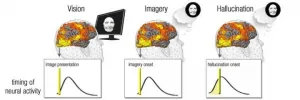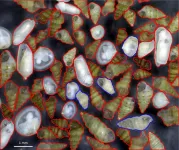Beating the bulge with a nice cup of tea
Researchers led by the University of Tsukuba find that drinking two cups of oolong tea a day can stimulate fat breakdown while you sleep
2021-01-07
(Press-News.org) Tsukuba, Japan - Does losing weight while you sleep sound too good to be true? According to a study by the University of Tsukuba, it seems that drinking oolong tea might help you do just that.
While all tea comes from the same plant, Camellia sinensis, the degree of oxidation, a chemical reaction that turns tea leaves black, defines its specific type. For example, green tea is unoxidized and mild in flavor, while the distinctive color of black tea comes from complete oxidation. Oolong tea, being only partially oxidized, lies somewhere in between and displays characteristics of both green and black tea. But while green tea is lauded for its health benefits, oolong tea remains more of an unknown.
"Like all teas, oolong contains caffeine, which impacts energy metabolism by increasing our heart rate. However, studies suggest that tea consumption may also increase the breakdown of fat, independent of the effects of caffeine," explains senior author of the study Professor Kumpei Tokuyama. "We therefore wanted to examine the effects of oolong consumption versus caffeine alone on energy and fat metabolism among a group of healthy volunteers."
Publishing their results in a recent issue of the journal Nutrients, the researchers found that both oolong tea and pure caffeine increased fat breakdown by about 20% in the healthy volunteers compared with the placebo, and that oolong tea continued to have an effect while the participants were asleep. Interestingly, neither treatment caused an increase in energy expenditure, indicating that the volunteers developed a tolerance to the stimulatory effects of caffeine over the 2-week study period.
Because a lack of sleep can impact energy metabolism, and because caffeine is known to inhibit sleep, the researchers also studied the sleep patterns of the volunteers. Significantly, there was no noticeable difference in sleep patterns or the time it took participants to fall asleep between the treatment and placebo groups, indicating that drinking oolong tea is unlikely to prevent you from getting a good night's rest.
So should we all be downing copious cups of oolong tea to counteract the indulgences of the festive season?
According to Professor Tokuyama, the answer is maybe.
"The stimulatory effects of oolong tea on fat breakdown during sleep could have real clinical relevance for controlling body weight. However, we need to determine whether the effects we observed in the 2-week study translate into actual body fat loss over a prolonged period. In addition, we want to trial a decaffeinated oolong tea to better distinguish the effects of caffeine from other components of tea, which will help us understand exactly how oolong helps with fat breakdown."
INFORMATION:
The article, "Subacute Ingestion of Caffeine and Oolong Tea Increases Fat Oxidation without Affecting Energy Expenditure and Sleep Architecture: A Randomized, Placebo-Controlled, Double-Blinded Cross-Over Trial," was published in Nutrients at DOI: 10.3390/nu12123671.
ELSE PRESS RELEASES FROM THIS DATE:
2021-01-07
Some people have lost their eyesight, but they continue to "see." This phenomenon, a kind of vivid visual hallucination, is named after the Swiss doctor, Charles Bonnet, who described in 1769 how his completely blind grandfather experienced vivid, detailed visions of people, animals and objects. Charles Bonnet syndrome, which appears in those who have lost their eyesight, was investigated in a study led by scientists at the Weizmann Institute of Science. The findings, published today in Brain, suggest a mechanism by which normal, spontaneous activity in the visual centers of the brain can trigger visual hallucinations in the blind.
Prof. Rafi Malach and his group members of the Institute's Neurobiology Department research the phenomenon of spontaneous "resting-state" ...
2021-01-07
Research from life-saving charity Air Ambulance Kent Surrey Sussex (KSS) in partnership with the University of Surrey has shown the benefits of dispatching HEMS to patients with a sudden, unexplained LOC of medical origin and a high prevalence of acute neurological pathology.
The study - which is believed to be the first published about HEMS dispatch to non-trauma (neuro) cases - also highlights how HEMS dispatchers in dialogue with ambulance personnel are able to select patients requiring HEMS-specific interventions and, based on its findings, identifies opportunities to improve triage for these patients.
Through a retrospective study of all patients with a LOC ...
2021-01-07
In a study spanning four decades, researchers from the University of Hong Kong's Research Division for Ecology & Biodiversity (HKU) in the Faculty of Science, and Toho University's Department of Biology (Toho), Japan, have discovered that predation by snakes is pushing lizards to be active at warmer body temperatures on islands where snakes are present, in comparison to islands free from snakes. Their work also detected significant climatic warming throughout the years and found lizard body temperatures to have also increased accordingly. The findings show that lizard thermal biology is highly dependent on predation pressures ...
2021-01-07
Geneva, Switzerland, 7 January 2021 - 'Mini-brains' are pin-head sized collections of several different types of human brain cell. They are used as a tool, allowing scientists to learn about how the brain develops, study disease and test new medicines. Personalized 'mini-brains' can be grown from stem cells generated from a sample of human hair or skin and could shed light on how brain disease progresses in an individual and how this person may respond to drugs.
Research published today by a team of scientists and engineers from HEPIA and the Wyss Center for Bio and Neuroengineering, in the journal Frontiers in Bioengineering and Biotechnology, has revealed ...
2021-01-07
Until now, the reason why the drug levodopa (L-Dopa), which reduces the motor symptoms of Parkinson's disease, declines in efficacy after a few years' use has been unknown. A side effect that then often occur is involuntary movements. A Swedish-French collaboration, led from Uppsala University, has now been able to connect the problems with defective metabolism of L-Dopa in the brain. The study is published in Science Advances.
"The findings may lead to new strategies for treating advanced Parkinson's," says Professor Per Andrén of the Department of Pharmaceutical Biosciences at Uppsala University. He and Dr Erwan Bézard of the University of Bordeaux, France, headed ...
2021-01-07
The coastline of Israel is one of the warmest areas in the Mediterranean Sea. Here, most marine species have been at the limits of their tolerance to high temperatures for a long time - and now they are already beyond those limits. Global warming has led to an increase in sea temperatures beyond those temperatures that Mediterranean species can sustain. Consequently, many of them are going locally extinct.
Paolo Albano's team quantified this local extinction for marine molluscs, an invertebrate group encompassing snails, clams and mussels. They thoroughly surveyed the Israeli coastline and ...
2021-01-07
Sweden kept preschools, primary and lower secondary schools open during the spring of 2020. So far, little research has been done on the risk of children being seriously affected by COVID-19 when the schools were open. A study from Karolinska Institutet in Sweden has now shown that one child in 130,000 was treated in an intensive care unit on account of COVID-19 during March-June. The study has been published in New England Journal of Medicine.
So far, more than 80 million people have become ill with COVID-19 and globally, almost two million people have died from the disease. Many countries have closed down parts of society in order to reduce the spread of infection. One such measure has been to close schools. ...
2021-01-07
Men and women aged over 50 can reap similar relative benefits from resistance training, a new study led by UNSW Sydney shows.
While men are likely to gain more absolute muscle size, the gains relative to body size are on par to women's.
The findings, recently published in END ...
2021-01-07
Social media misinformation can negatively influence people's attitudes about vaccine safety and effectiveness, but credible organizations -- such as research universities and health institutions -- can play a pivotal role in debunking myths with simple tags that link to factual information, University of California, Davis, researchers, suggest in a new study.
Researchers found that fact-check tags located immediately below or near a post can generate more positive attitudes toward vaccines than misinformation alone, and perceived source expertise makes a difference.
"In fact, fact-checking labels ...
2021-01-07
An international team of researchers led by Swinburne University of Technology has demonstrated the world's fastest and most powerful optical neuromorphic processor for artificial intelligence (AI), which operates faster than 10 trillion operations per second (TeraOPs/s) and is capable of processing ultra-large scale data.
Published in the prestigious journal Nature, this breakthrough represents an enormous leap forward for neural networks and neuromorphic processing in general.
Artificial neural networks, a key form of AI, can 'learn' and perform complex operations with wide applications to computer vision, natural language processing, facial recognition, speech translation, ...
LAST 30 PRESS RELEASES:
[Press-News.org] Beating the bulge with a nice cup of tea
Researchers led by the University of Tsukuba find that drinking two cups of oolong tea a day can stimulate fat breakdown while you sleep





